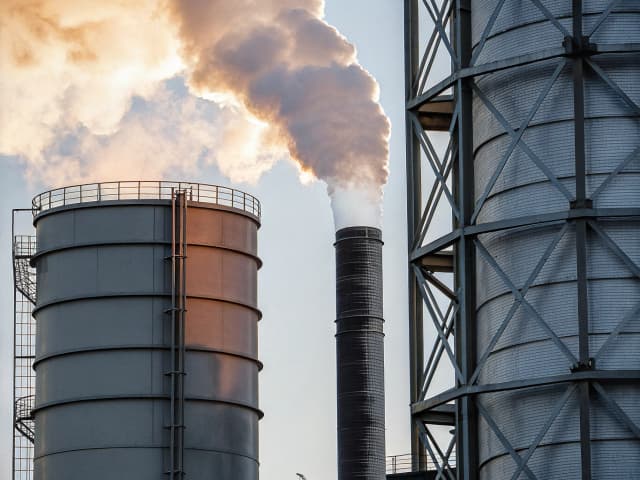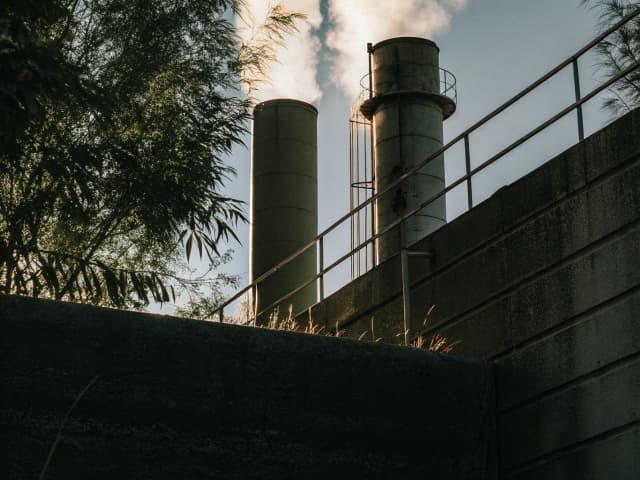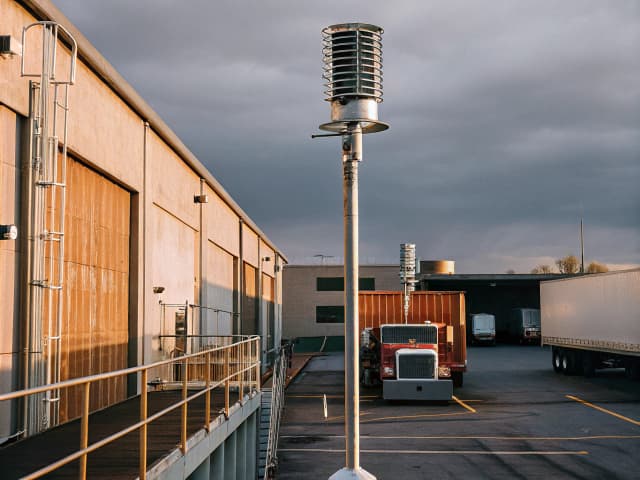Air Quality & Emissions

Greenhouse gases: Greenhouse Gas Reduction Fund: studies.
Directs revenues from the Greenhouse Gas Reduction Fund to dedicated climate funds. Ends continuous fund appropriations on July 1, 2026. Starts 2026–27 with priority allocations and multiyear spending plans. Requires offsets study by December 31, 2026.
Greenhouse gases: Greenhouse Gas Reduction Fund: studies.

Directs revenues from the Greenhouse Gas Reduction Fund to dedicated climate funds. Ends continuous fund appropriations on July 1, 2026. Starts 2026–27 with priority allocations and multiyear spending plans. Requires offsets study by December 31, 2026.

California Workforce Development Board: port automation.
Establishes a 17-member industry panel to address automation impacts at California seaports through 2029. Requires monthly stakeholder meetings to develop recommendations on port automation security and workforce impacts. Mandates final recommendations from the Labor and Workforce Development Agency by July 2027. Requires legislative funding approval before implementation of any proposed measures.
California Workforce Development Board: port automation.

Establishes a 17-member industry panel to address automation impacts at California seaports through 2029. Requires monthly stakeholder meetings to develop recommendations on port automation security and workforce impacts. Mandates final recommendations from the Labor and Workforce Development Agency by July 2027. Requires legislative funding approval before implementation of any proposed measures.

Agricultural workers: wages, hours, and working conditions: definitions.
Excludes sheepherders and goat herders from agricultural worker overtime protections. Modifies existing labor laws to create separate classification for herding occupations. Affects wage and hour requirements for herding workers previously covered under agricultural rules.
Agricultural workers: wages, hours, and working conditions: definitions.

Excludes sheepherders and goat herders from agricultural worker overtime protections. Modifies existing labor laws to create separate classification for herding occupations. Affects wage and hour requirements for herding workers previously covered under agricultural rules.

California Contractor Climate Transparency Act.
Requires state contractors to report their annual greenhouse gas emissions starting in 2026. Mandates large contractors earning over $25 million from state contracts to disclose all emissions and climate risks. Requires contractors earning $5-25 million to report direct and purchased energy emissions only. Builds upon existing climate reporting laws to increase transparency in state contracting.
California Contractor Climate Transparency Act.

Requires state contractors to report their annual greenhouse gas emissions starting in 2026. Mandates large contractors earning over $25 million from state contracts to disclose all emissions and climate risks. Requires contractors earning $5-25 million to report direct and purchased energy emissions only. Builds upon existing climate reporting laws to increase transparency in state contracting.

Zero-emission vehicles: workforce development: Clean Energy Workforce Training Council.
Undeveloped "intent bill" that aims to create training programs for zero-emission vehicle technicians. Proposes establishing a council to analyze workforce and infrastructure needs for clean energy technologies.
Zero-emission vehicles: workforce development: Clean Energy Workforce Training Council.

Undeveloped "intent bill" that aims to create training programs for zero-emission vehicle technicians. Proposes establishing a council to analyze workforce and infrastructure needs for clean energy technologies.

Ports: truck drivers.
Establishes quarterly truck-entry data disclosure for Long Beach and LA. Mandates annual employee tax withholding affirmation and driver identification data. Public data release starts 2027; penalties for false data and 50% threshold updates.
Ports: truck drivers.

Establishes quarterly truck-entry data disclosure for Long Beach and LA. Mandates annual employee tax withholding affirmation and driver identification data. Public data release starts 2027; penalties for false data and 50% threshold updates.

Polluters Pay Climate Superfund Act of 2025.
Establishes a Climate Superfund Program requiring major fossil fuel companies to pay for climate damages from 1990-2024. Requires companies responsible for over 1 billion metric tons of emissions to pay their proportional share of damages. Mandates that 40% of collected funds benefit disadvantaged communities impacted by climate change. Creates enforcement mechanisms including business license revocation for companies that fail to pay assessed costs.
Polluters Pay Climate Superfund Act of 2025.

Establishes a Climate Superfund Program requiring major fossil fuel companies to pay for climate damages from 1990-2024. Requires companies responsible for over 1 billion metric tons of emissions to pay their proportional share of damages. Mandates that 40% of collected funds benefit disadvantaged communities impacted by climate change. Creates enforcement mechanisms including business license revocation for companies that fail to pay assessed costs.

Air pollution control and air quality management districts: permit information: internet website.
Requires air districts to publish online maps showing locations and details of facilities with air pollution permits. Mandates public disclosure of emission credits, control technologies, and contact information for each permitted facility. Empowers communities to monitor local air pollution sources through enhanced permit transparency. Allows districts to levy fees to cover costs of implementing the online mapping system.
Air pollution control and air quality management districts: permit information: internet website.

Requires air districts to publish online maps showing locations and details of facilities with air pollution permits. Mandates public disclosure of emission credits, control technologies, and contact information for each permitted facility. Empowers communities to monitor local air pollution sources through enhanced permit transparency. Allows districts to levy fees to cover costs of implementing the online mapping system.

Transit operators: paratransit: recertification of eligibility.
Establishes a streamlined recertification process for paratransit eligibility to standardize reviews. Requires transit operators to establish the streamlined process by January 1, 2027 and use it by June 1, 2027. Defines eligible persons as permanently disabled with no expected fixed-route access improvement. Allows contracting the recertification while the operator retains final eligibility decisions.
Transit operators: paratransit: recertification of eligibility.

Establishes a streamlined recertification process for paratransit eligibility to standardize reviews. Requires transit operators to establish the streamlined process by January 1, 2027 and use it by June 1, 2027. Defines eligible persons as permanently disabled with no expected fixed-route access improvement. Allows contracting the recertification while the operator retains final eligibility decisions.

Polluters Pay Climate Superfund Act of 2025.
Establishes a Climate Superfund Program requiring fossil fuel companies to pay for climate damages from 1990-2024. Requires companies responsible for over 1 billion metric tons of emissions to pay into the fund by October 2026. Mandates at least 40% of collected funds benefit disadvantaged communities impacted by climate change. Creates enforcement mechanisms including business license revocation and 10% annual late fees for non-payment.
Polluters Pay Climate Superfund Act of 2025.

Establishes a Climate Superfund Program requiring fossil fuel companies to pay for climate damages from 1990-2024. Requires companies responsible for over 1 billion metric tons of emissions to pay into the fund by October 2026. Mandates at least 40% of collected funds benefit disadvantaged communities impacted by climate change. Creates enforcement mechanisms including business license revocation and 10% annual late fees for non-payment.

Climate change: market-based compliance mechanism: extension.
Extends the California Cap-and-Invest program through 2046 to continue emissions reductions. Creates the California Climate Mitigation Fund to fund direct household rebates. Sets offset credit limits and creates offset task force and advisory committee. Mandates affordability by shifting support from gas corporations to electric utilities.
Climate change: market-based compliance mechanism: extension.

Extends the California Cap-and-Invest program through 2046 to continue emissions reductions. Creates the California Climate Mitigation Fund to fund direct household rebates. Sets offset credit limits and creates offset task force and advisory committee. Mandates affordability by shifting support from gas corporations to electric utilities.

Carbon Dioxide Removal Purchase Program.
Establishes the Carbon Dioxide Removal Purchase Program to fund in-state projects. Requires ARB to administer competitive grants with caps and hold workshops and publish surveys. Allocates up to $50 million over 2026–2035 with up to 10% for admin costs. Imposes in-state location, additionality, third-party purchases, 100-year storage, and no EOR.
Carbon Dioxide Removal Purchase Program.

Establishes the Carbon Dioxide Removal Purchase Program to fund in-state projects. Requires ARB to administer competitive grants with caps and hold workshops and publish surveys. Allocates up to $50 million over 2026–2035 with up to 10% for admin costs. Imposes in-state location, additionality, third-party purchases, 100-year storage, and no EOR.

Methane emissions: petroleum and natural gas producing low methane emissions.
Establishes a state-wide mandate to prioritize methane reductions using MMRV across agencies. Authorizes ARB, PUC, and other agencies to apply MMRV to existing programs. Encourages certified low-methane natural gas procurement where feasible and cost-effective. Contains no new penalties and relies on existing regulatory enforcement.
Methane emissions: petroleum and natural gas producing low methane emissions.

Establishes a state-wide mandate to prioritize methane reductions using MMRV across agencies. Authorizes ARB, PUC, and other agencies to apply MMRV to existing programs. Encourages certified low-methane natural gas procurement where feasible and cost-effective. Contains no new penalties and relies on existing regulatory enforcement.

Air basins.
Undeveloped "intent bill" that aims to create future legislation related to clean air basins.
Air basins.

Undeveloped "intent bill" that aims to create future legislation related to clean air basins.

South Coast Air Quality Management District: air quality.
Requires aggregate facilities near homes and schools to control dust emissions through new monitoring systems by 2027. Mandates facilities to maintain storage piles under 8 feet tall and install protective fencing around the property. Requires full enclosure of storage piles by July 2027 for facilities repeatedly exceeding pollution limits. Establishes monthly inspections for facilities that exceed particulate matter limits near sensitive areas.
South Coast Air Quality Management District: air quality.

Requires aggregate facilities near homes and schools to control dust emissions through new monitoring systems by 2027. Mandates facilities to maintain storage piles under 8 feet tall and install protective fencing around the property. Requires full enclosure of storage piles by July 2027 for facilities repeatedly exceeding pollution limits. Establishes monthly inspections for facilities that exceed particulate matter limits near sensitive areas.

State Air Resources Board: regional air quality incident response program.
Establishes a statewide network of emergency air quality monitoring centers to respond to environmental disasters. Requires at least one monitoring center in Southern California's air quality management district. Creates a State Air Quality Health Officer position to coordinate emergency response and public health data. Mandates coordination between state and local agencies during air quality emergencies.
State Air Resources Board: regional air quality incident response program.

Establishes a statewide network of emergency air quality monitoring centers to respond to environmental disasters. Requires at least one monitoring center in Southern California's air quality management district. Creates a State Air Quality Health Officer position to coordinate emergency response and public health data. Mandates coordination between state and local agencies during air quality emergencies.

Marine Carbon Initiative.
Establishes a Marine Carbon Initiative to research and develop ocean-based methods for removing carbon dioxide from the atmosphere. Creates a 7-member Marine Carbon Council by July 2027 to guide research and make recommendations on marine carbon removal. Launches a competitive grant program by August 2028 to fund marine carbon removal research projects in California. Allocates $2 million annually for seven years to support marine carbon removal research and development.
Marine Carbon Initiative.

Establishes a Marine Carbon Initiative to research and develop ocean-based methods for removing carbon dioxide from the atmosphere. Creates a 7-member Marine Carbon Council by July 2027 to guide research and make recommendations on marine carbon removal. Launches a competitive grant program by August 2028 to fund marine carbon removal research projects in California. Allocates $2 million annually for seven years to support marine carbon removal research and development.

Advanced Clean Fleets Regulation: appeals advisory committee: exemptions.
Establishes a new appeals committee to review denied exemption requests for clean fleet regulations. Requires the committee to make recommendations on appeals within 60 days of submission. Exempts emergency response and support vehicles from zero-emission vehicle requirements. Prohibits requiring fleet owners to show purchase agreements when requesting transition deadline extensions.
Advanced Clean Fleets Regulation: appeals advisory committee: exemptions.

Establishes a new appeals committee to review denied exemption requests for clean fleet regulations. Requires the committee to make recommendations on appeals within 60 days of submission. Exempts emergency response and support vehicles from zero-emission vehicle requirements. Prohibits requiring fleet owners to show purchase agreements when requesting transition deadline extensions.

State Air Resources Board: regulatory authority: revocation.
Revokes the Air Resources Board's authority to regulate greenhouse gas emissions after January 1, 2026. Transforms the Air Resources Board into an advisory body that can only propose measures to the Legislature. Preserves all existing Air Resources Board regulations enacted before January 1, 2026.
State Air Resources Board: regulatory authority: revocation.

Revokes the Air Resources Board's authority to regulate greenhouse gas emissions after January 1, 2026. Transforms the Air Resources Board into an advisory body that can only propose measures to the Legislature. Preserves all existing Air Resources Board regulations enacted before January 1, 2026.

Air pollution: indirect sources.
Expands state authority to regulate indirect sources of air pollution like ports and warehouses to reduce emissions. Requires air districts to implement state regulations within 120 days or develop their own stricter rules. Establishes new fees on facilities and vehicles to fund enforcement of air quality regulations. Mandates annual public reporting on the impacts of indirect source pollution regulations.
Air pollution: indirect sources.

Expands state authority to regulate indirect sources of air pollution like ports and warehouses to reduce emissions. Requires air districts to implement state regulations within 120 days or develop their own stricter rules. Establishes new fees on facilities and vehicles to fund enforcement of air quality regulations. Mandates annual public reporting on the impacts of indirect source pollution regulations.

Public resources: transportation of carbon dioxide.
Requires the State Fire Marshal to adopt comprehensive safety regulations for carbon dioxide pipelines by July 2026. Prohibits the conversion of existing pipelines to transport carbon dioxide and mandates new construction standards. Establishes a two-mile emergency planning zone around CO2 pipelines with mandatory mapping and notification requirements. Mandates pipeline shutdown after ruptures until investigations determine the cause and grants the Fire Marshal emergency shutdown authority.
Public resources: transportation of carbon dioxide.

Requires the State Fire Marshal to adopt comprehensive safety regulations for carbon dioxide pipelines by July 2026. Prohibits the conversion of existing pipelines to transport carbon dioxide and mandates new construction standards. Establishes a two-mile emergency planning zone around CO2 pipelines with mandatory mapping and notification requirements. Mandates pipeline shutdown after ruptures until investigations determine the cause and grants the Fire Marshal emergency shutdown authority.

California Environmental Quality Act: expedited judicial review: sustainable aviation fuel projects.
Authorizes the Governor to certify up to three sustainable aviation fuel production projects for expedited environmental review. Requires certified projects to avoid using fossil fuels and demonstrate reduced emissions in disadvantaged communities. Mandates project applicants to pay all legal and administrative costs for environmental review challenges. Establishes a 270-day timeline for courts to resolve legal challenges to certified projects.
California Environmental Quality Act: expedited judicial review: sustainable aviation fuel projects.

Authorizes the Governor to certify up to three sustainable aviation fuel production projects for expedited environmental review. Requires certified projects to avoid using fossil fuels and demonstrate reduced emissions in disadvantaged communities. Mandates project applicants to pay all legal and administrative costs for environmental review challenges. Establishes a 270-day timeline for courts to resolve legal challenges to certified projects.

State Air Resources Board: membership: removal: regulations: review.
Authorizes the Legislature to remove Air Resources Board members for incompetence or corruption. Requires economic analysis for regulations costing California consumers over $10 million. Mandates publication of all board documents 72 hours before votes with no last-minute changes. Adds two non-voting legislative members to the Air Resources Board.
State Air Resources Board: membership: removal: regulations: review.

Authorizes the Legislature to remove Air Resources Board members for incompetence or corruption. Requires economic analysis for regulations costing California consumers over $10 million. Mandates publication of all board documents 72 hours before votes with no last-minute changes. Adds two non-voting legislative members to the Air Resources Board.

Planning and zoning: logistics use developments: truck routes.
Makes technical changes to clarify logistics definitions and harmonize standards.
Planning and zoning: logistics use developments: truck routes.

Makes technical changes to clarify logistics definitions and harmonize standards.

Hydrofluorocarbon gases: sale and distribution prohibition: exemptions.
Tightens HFC rules with phased GWP limits: 2,200 (2025), 1,500 (2030), 750 (2033). Narrow exemptions to certified reclaimed refrigerants via certification and 15% max new content. Sunsets the MDI exemption by 2030 and the very-low-temp exemption by 2028. Requires board rulemaking to push low- or ultra-low-GWP alternatives.
Hydrofluorocarbon gases: sale and distribution prohibition: exemptions.

Tightens HFC rules with phased GWP limits: 2,200 (2025), 1,500 (2030), 750 (2033). Narrow exemptions to certified reclaimed refrigerants via certification and 15% max new content. Sunsets the MDI exemption by 2030 and the very-low-temp exemption by 2028. Requires board rulemaking to push low- or ultra-low-GWP alternatives.